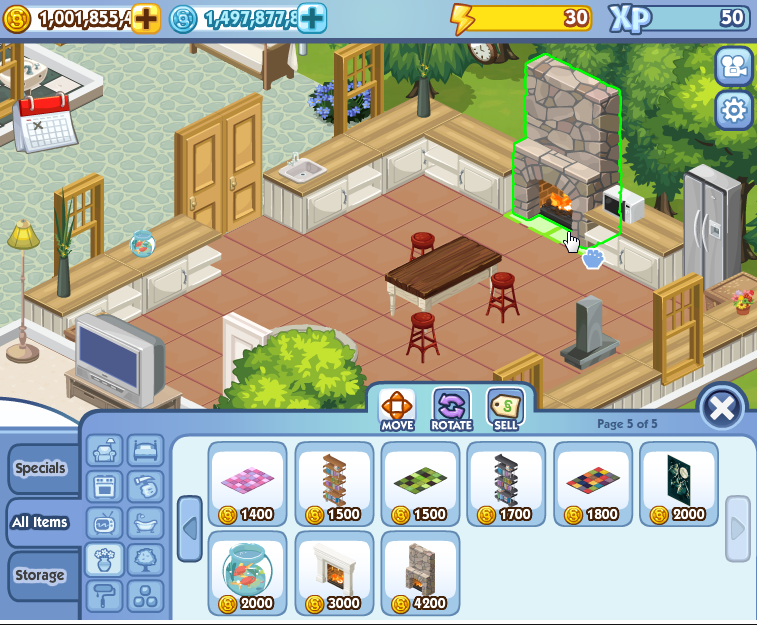Hooking up
The Sims has always tried to emphasize social interactions between sims in the game, and The Sims Social is no different. While the game is asynchronous, it still expects you to regularly interact with other sims. As you talk (or insult, or flirt) with other sims, your friendship (or enemy rating) grows. When you pass certain thresholds, you have to agree with another Facebook user whether you want to take your friendship — or enemy-ship — to the next level.
 Yes, that’s right: enemy-ship. The Sims is known for shooting from the hip, and EA’s social game doesn’t pull any punches. You can walk into another sim’s house and start kicking over garbage cans, re-arranging keyboards and planting dead fish in beds. You can imply another sim’s mother is a llama or ruthlessly point out their flaws.
Yes, that’s right: enemy-ship. The Sims is known for shooting from the hip, and EA’s social game doesn’t pull any punches. You can walk into another sim’s house and start kicking over garbage cans, re-arranging keyboards and planting dead fish in beds. You can imply another sim’s mother is a llama or ruthlessly point out their flaws.
It’s a kind of zen experience that brings out your inner troublemaker without too much downside. I spent most of my time taunting and teasing Bella and wreaking havoc in her house. Karma paid me back eventually when I returned to my house to find one of the other members of the press I’d added as a friend had re-arranged the keys on my keyboard. It seemed like everyone was having much more fun trying to create chaos rather than find new friends.
The more of a jerk you are, the more options you unlock for being an even bigger jerk to another sim. But there’s one odd quirk — you have to agree to be jerks to each other before that enemy relationship gets even worse. The same is true for the other side of the relationship — you have to agree to be friends, good friends, and potentially even romantically involved. As your friendship progresses, you unlock more actions that, well, romantically involved persons usually engage in.
(Although it seems like this could easily get out of hand. Being “Facebook official” is a pretty big deal today — I can’t imagine how big of a deal being “Sims Social official” will be. A relationship within a relationship.)
There are four “currencies” in The Sims Social. The first is simoleons — which Sims users will recognize from the original computer games — that players earn by completing tasks. This is the main currency gamers use to purchase new things for their Sims, such as new clothes and furniture for their homes. Then there’s SimCash, which players can buy using real-world money. They can convert that SimCash to simoleons or buy special items that you can only buy with SimCash.
There’s a third currency, called social points, that you unlock by talking to other sims and interacting with them. You can use those points to buy social-specific items, like a hot tub. You can also buy social points with SimCash. The only currency in the game that isn’t available through SimCash is Lifetime Points, which you get for learning new skills and advancing your character. You can use those points to buy traits that make your sim need to sleep less or turn into a ninja.
SimCash can also be used to quickly advance through quests in the game — such as buying critical quest items and skipping certain parts of the game. You can buy additional energy with cash, too. Just about everything in the game — aside from a few premium household items and clothes — is available without SimCash, but that cash really speeds up the game.
“It’s a time versus money argument,” Houston said. “You can access all of this with enough time, or you can spend your SimCash to blitz through it.”
EA and Playfish have partnered with TrialPay to give players additional ways to get SimCash without having to pay for it. That includes signing up for special offers, such as a monthly trial for Netflix or a free membership with 24-hour fitness. But outside of that, EA sells the SimCash with a number of different transaction providers, including phone operators, credit cards and PayPal.
Next Page: Learning from past mistakes


